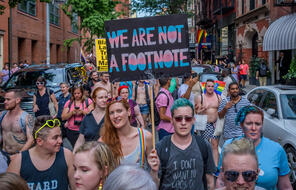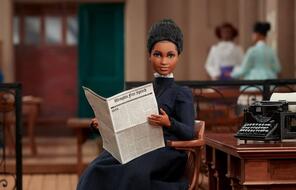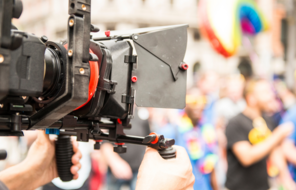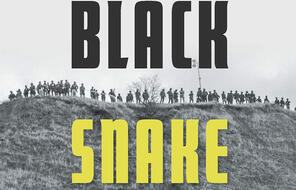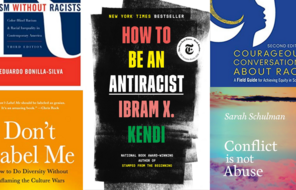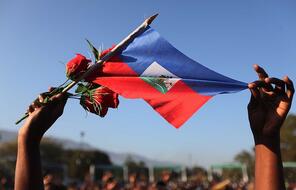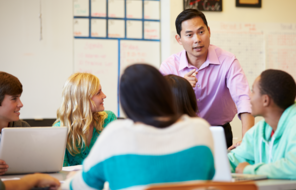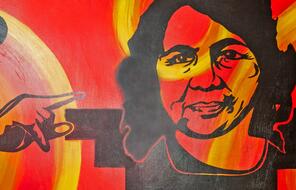
5 Reads for Teachers on LGBTQIA+ History
In order for educators to ensure that LGBTQIA+ histories get their due in the classroom all year long, Facing History provides five reads that reflect on evolving ways of narrating the past, while centering underacknowledged narratives and protagonists who may not have been considered appropriate historical subjects in prior eras.
Today's educators face an important opportunity to ensure that LGBTQIA+ histories get their due in the classroom all year long. But before any educator can meaningfully embark upon that task, they must commit to their own ongoing learning about LGBTQIA+ histories. History as we understand it is in a constant state of expansion and retelling and, as a result, all history teachers gain from maintaining the mindset of the student even as they teach.
Below are excerpts from three essays and two interviews previously published that reflect these evolving ways of narrating the past, drawing attention to underacknowledged historical narratives and protagonists who may not have been considered appropriate historical subjects in prior eras:
- Brother Outsider: Remembering Gay Civil Rights Leader Bayard Rustin
“LGBTQ Pride Month every June is an opportunity to explore and amplify the stories of LGBTQ people past and present. But even during Pride Month, we seldom hear stories of LGBTQ people of color. Described as the “unknown hero” of the Civil Rights Movement, Bayard Rustin was the openly gay African American civil rights activist who served as the chief organizer of the historic March on Washington. But why is Rustin so often omitted from the pantheon of African American leaders we learn about in school and pop culture—and how can including his story enrich our understanding of black and LGBTQ history?...”
- Exploring Audre Lorde’s Legacies
“...One key figure who has left an indelible mark on intersectional thought and organizing is the Black lesbian scholar, feminist, mother, and poet Audre Lorde. Born in 1934, Lorde not only challenged her contemporaries to think about identity and politics intersectionally, but also challenged them to value the inner emotional landscape as a core resource in the work of liberation…”
- Stonewall Was Important but Not Because it Was First
“...With a few decades of perspective, we now know that the Stonewall Uprising was one in a long line of LGBTQ protests… In 1951, Jose Sarria, owner of The Black Cat, a gay bar in San Francisco, successfully sued the State of California for the right to serve ‘known homosexuals.’ In Los Angeles, Harry Hay formed the Mattachine Society for gay men in 1950 and in 1955, Del Martin and Phyllis Lyons founded the Daughters of Bilitis for lesbians in San Francisco. These were the first gay civil rights organizations in the United States. In 1965, the Compton’s Cafeteria riot occurred when drag queens and other queer people refused to leave an all-night eatery in San Francisco’s Tenderloin district because of a ‘service fee’ the management imposed on cross-dressing patrons…”
- How One Lesbian Couple Defied the Nazis: An Interview with Dr. Jeffrey Jackson
“In a recent interview, I spoke with Dr. Jeffrey Jackson—Professor of History at Rhodes College and author of Paper Bullets: Two Artists Who Risked Their Lives to Defy the Nazis. In this interview. Dr. Jackson discusses the untold story of Lucy Schwob and Suzanne Malherbe, a French lesbian couple who intervened in the Nazi occupation of the Channel Islands through an expansive artistic campaign during World War II. Better known to art historians by their adopted names of Claude Cahun and Marcel Moore, Schwob and Malherbe’s story of resistance is told for the first time in Dr. Jackson’s new book. Here he shares a first look at their incredible story with Facing History.”
- Centering Queer History and Students in the Classroom: Insights from Eric Marcus
“Eric Marcus, host of the acclaimed Making Gay History podcast and author of Making Gay History, spoke with Facing History in a recent webinar about teaching students with LGBTQIA+ histories and experiences in mind. Marcus’ critically acclaimed podcast is based on a wealth of exclusive interviews he conducted with LGBTQIA+ people beginning in the 1980s. Here we highlight some of Marcus’ most essential insights about the importance of teaching and learning LGBTQIA+ history, as well as the impact on students with those identities.”
More Like This
Ideas this Week
Donate now and together we'll build a better world
Make a 100% tax-deductible donation today and you'll help us reach even more teachers and students around the world, giving them the tools to fight back against hatred and bigotry.




